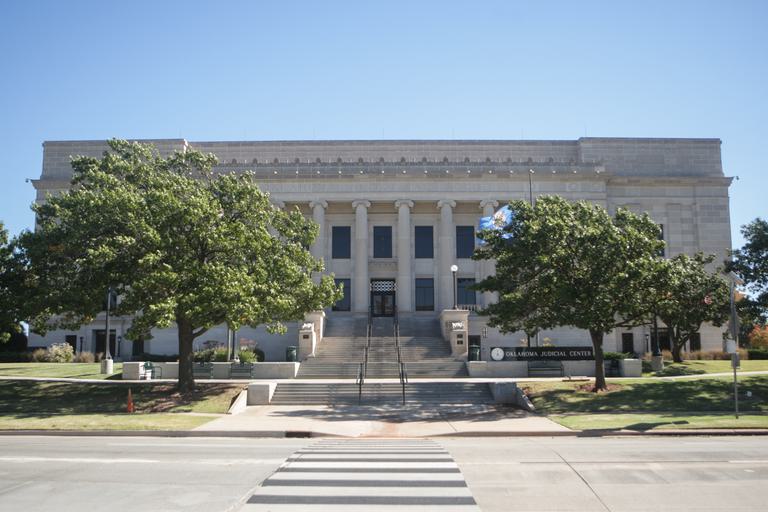
Judicial Reform , Law & Principles , Good Government
Ray Carter | February 25, 2020
Lawmakers seek sunlight for Oklahoma judicial processes
Ray Carter
The operations of the Oklahoma Supreme Court and the state’s Judicial Nominating Commission have long drawn criticism for excessive secrecy and lack of public transparency.
Two bills that have cleared a Senate committee seek to address that problem.
Senate Bill 1651, by Sen. Julie Daniels, would require the Oklahoma Supreme Court to make its docket public.
“I have looked at websites of other states and it’s much more transparent and available to the public and those who practice in the courts to be able to monitor cases that may be coming before the court,” said Daniels, R-Bartlesville.
“Isn’t this already information that’s available on the Supreme Court network?” asked Senate Democratic Leader Kay Floyd of Oklahoma City.
“There is, to my knowledge, no calendar,” Daniels said. “There’s no posting of oral arguments.”
Sen. Brent Howard, R-Altus, agreed that there is little transparency provided by the court through the Oklahoma Supreme Court Network (OSCN).
“You can look up specific cases, if you know those, on OSCN, but actually going in and looking at a calendar is not available,” Howard said. “When we’re talking about transparency and openness in government, this is something that we publish our agendas on the legislative side and I think that the Supreme Court, being top court of our state, should as well.”
Benjamin Lepak, a legal fellow at the 1889 Institute, has written of problems with the secrecy of the Oklahoma Supreme Court, noting, “Court dockets are routinely published all across the United States and at every level, from the lowest traffic court to the United States Supreme Court. But, incredibly, not at the Oklahoma Supreme Court.”
SB 1651 requires the Oklahoma Supreme Court to publish online a calendar of cases pending before the court that includes the dates the court will hear oral arguments and hearings before referees. In cases involving constitutional challenges to state laws, the court would be required to publish the briefing schedule.
The court would also be required to include case names, case numbers, counsel of record, and a brief description of the issues in each case. Under the bill, the Oklahoma Supreme Court would also be required to publicly list lower-court rulings it has agreed to review.
SB 1651 passed the Senate Judiciary Committee on a 10-1 vote. The only opponent was Sen. Mary Boren, D-Norman.
Another measure authored by Daniels would increase transparency for the state’s Judicial Nominating Commission, a group that is charged with selecting a handful of nominees for major court vacancies.
The governor is allowed to appoint only people pre-approved by the commission.
Oklahoma is one of 12 states with a “Missouri plan” judicial nominating commission. When Lepak reviewed the transparency requirements for JNC entities in most states, he found Oklahoma’s process was one of the most secretive.
The closed process may have also played a role in masking conflict-of-interest concerns. In 2019, a JNC member was found to have previously given campaign donations to one judicial candidate.
Senate Bill 1801, by Daniels, would make the Judicial Nominating Commission subject to the Open Meetings Act, with exceptions provided for certain executive sessions in which members discuss the merits of judicial applicants. All votes and candidate interviews would be conducted in open meetings.
Sen. Michael Brooks, D-Oklahoma City, suggested that attorneys might not apply for judicial positions if their current employer could learn of the application due to open-meeting requirements.
“If these meetings are open to the public, other than specific background information, would this chill the likelihood that we would get those candidates applying for these positions?” Brooks asked.
Daniels responded that the Judicial Nominating Commission “has a lot of power” and “needs to be more transparent.”
“They are the gatekeepers to the three names that go to the governor for appointment to our highest courts,” Daniels said. “We deal in this committee all the time with decisions of the Supreme Court that affect the legislative policies that we put in place, so as the third branch of government, they’re an equal branch of government. I as a citizen want to know more about the people who are applying. I want to see the discussion. I want to see the vote in the JNC because their role is so important. I cannot speak specifically to whether or not this would have a chilling effect. These folks are applying to be on the Supreme Court, Court of Criminal Appeals, Court of Civil Appeals, and I believe the citizens of Oklahoma deserve to see more of that process.”
Daniels noted that in most other states with a JNC process for judicial selection, the nominating commission’s activities are subject to open-meeting requirements.
SB 1801 passed the Senate Judiciary Committee on a party-line vote of 8-3 with Democrats in opposition.

Ray Carter
Director, Center for Independent Journalism
Ray Carter is the director of OCPA’s Center for Independent Journalism. He has two decades of experience in journalism and communications. He previously served as senior Capitol reporter for The Journal Record, media director for the Oklahoma House of Representatives, and chief editorial writer at The Oklahoman. As a reporter for The Journal Record, Carter received 12 Carl Rogan Awards in four years—including awards for investigative reporting, general news reporting, feature writing, spot news reporting, business reporting, and sports reporting. While at The Oklahoman, he was the recipient of several awards, including first place in the editorial writing category of the Associated Press/Oklahoma News Executives Carl Rogan Memorial News Excellence Competition for an editorial on the history of racism in the Oklahoma legislature.